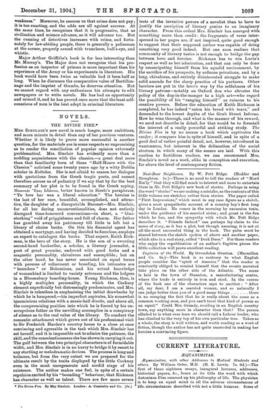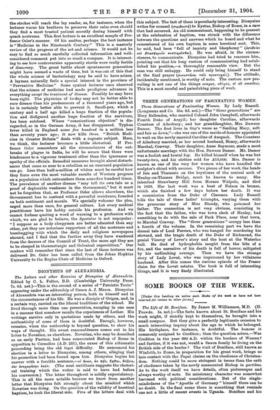EQUANIMITAS.
the strokes will reach the lay reader, as, for instance, when the lecturer warns his brethren to preserve their calm even should they find a most trusted patient secretly dosing himself with quack nostrums. This first lecture is an excellent sample of Pro- fessor Osler's manner. Of his matter, perhaps the best instance is "Medicine in the Nineteenth Century." This is a masterly review of the progress of the art and science. It would not be easy to find so much carefully collected information and well- considered comment put into so small a compass. It is interest- ing to see how controversies apparently sterile were really fertile of discovery. The great battle about spontaneous generation might have seemed a waste of time, but it was out of this that the whole science of bacteriology may be said to have arisen. A layman naturally feels a special interest in the province of "Preventive Medicine." Some cynical lecturer once observed that the science of medicine had made prodigious advances in everything except the treatment of disease. Possibly he may have been right. The physician of to-day may not be better able to cure disease than his predecessors of a thousand years ago, but he is certainly better able to prevent it. Small-pox, which a century and a half ago killed a huge fraction of the popula- tion and disfigured another huge fraction of the survivors, has been subdued. Where "conscientious objection" is dis- regarded, as in the German Army, it has disappeared. Typhus fever killed in England some five hundred in a million less than seventy years ago ; it now kills three. "British Medi- cine in Greater Britain" deals with a cognate subject. Here, we think, the lecturer becomes a little rhetorical. If Pro- fessor Osier remembers all the circumstances of the out- breaks of plague in India, he will be aware that there were hindrances to a vigorous treatment other than the ignorance or apathy of the officials. Remedial measures brought about disturb- ances that came as near to a rebellion as an unarmed population can go. Less than half-a-million of whites must be careful how they force even the most valuable results of Western progress on a population which outnumbers them some five hundred times. The prevalence of another disease "may tell its own tale as a proof of deplorable weakness in the Government," but it must not be forgotten that, as Professor Osler allows elsewhere, the Government has to contend with a powerful resistance, founded on both sentiment and morals. We specially welcome the plea, urged more than once, for general culture. Let every medical practitioner have his hobby outside his profession. And we cannot forbear quoting a word of warning to a profession with which, we are glad to believe, the Spectator is not unpopular : "I suppose as a body clergymen are better educated than any other, yet they are notorious supporters of all the nostrums and humbugging with which the daily and religious newspapers abound, and I find that the further away they have wandered from the decrees of the Council of Trent, the more apt they are to be steeped in thaumaturgic and Galenical superstition." Our readers will remember that since the last of these lectures was delivered Dr. Osier has been called from the Johns Hopkins University to the Regius Chair of Medicine in Oxford.



































 Previous page
Previous page